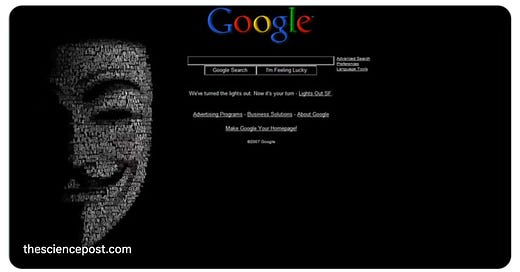If you’re like me, you first heard the term “fake news” during the presidency of Donald Trump. It was one of many terms that the former president introduced into my lexicon, and one that I brushed off as derogatory and baseless. Just because a piece of news is inconvenient, doesn’t make it fake, right?
Turns out I was wrong on two counts:
Trump did not coin the phrase “fake news”—he appropriated it.
Fake news is most certainly a real thing.
Let’s look at a case study that came across my desk today. A good friend and trusted colleague of mine sent me the following Tweet by Dr. David Cartland:
I’ll defer to my friends at
and to explain who and what Anonymous is/is not. Luckily, we need not be an expert on that subject in order to apply our media literacy skills here.Let’s make something very clear: there are “paid pharma shills” all over the public discourse, particularly in the context of the global COVID-19 response. I’ve spent a significant amount of time over the last several years documenting them and their conflicts of interest on the Campfire Wiki and COVID Truth Initiative. In other words, I’m already onboard with the premise and am in the target audience for this article.
I’m not the only one. As I’m writing this sentence, Dr. Cartland’s Tweet has some 13,700 views, 297 reposts, 13 quotes, 541 likes, and 42 bookmarks.
I wonder how many of those people actually clicked the link to the article. Those that did would have been taken to a website called The Science Post. The contents of the article itself aren’t terribly surprising, listing off genuinely questionable “experts” such as Paul Offitt, David Gorski and Neil deGrasse Tyson.
But let’s back it up, because we’ve got a problem here: the article is dated March 4, 2017. In other words, even if the information contained in the article is legit, it’s most certainly not breaking news, and is not as relevant to the present day as Dr. Cartland suggests by sharing the link absent any context.
For that matter, what does it mean to “hack Big Pharma”?
But we didn’t even need to read this far down, to be blunt. Look closer at The Science Post logo right at the top of the webpage:
That’s right—The Science Post: Science, Health, Satire.
In fairness, some outlets offer a combination of real news and satire, including some with dedicated satire columns. As such, it’s still in the realm of possibility that this is a genuine article.
…until we read the fine print. Scroll to the very bottom of the page, and you’ll find a disclaimer that reads: “All stories are made up.”
There are other clues that should also alert us to the satirical nature of this website. For example, take a look at the headlines of the latest articles featured on The Science Post’s front page:
Moderna scientists reportedly struggling to add microchips to latest boosters
Thousands rush to exchange online medical degree for Google PhD in foreign policy
Wearing a mask may help protect against deadly chemtrails, new study finds
In my opinion, these are genuinely funny headlines. But they’re clearly satire, and it takes no more than 30 seconds of active critical thinking to devise their true meaning. Beyond stimulating a good chuckle, these four articles also present an opportunity to trick well-meaning dissidents into sharing stories that are indisputably fake. It then becomes much easier for institutional media or individuals concerned about “disinformation” to dismiss those same people when they share articles or pieces of news that actually do challenge the status quo on topics such as COVID-19 vaccine safety, the realities of the Russia-Ukraine war, the safety and efficacy of masks and face coverings, and geoengineering.
In other words, it will almost always be the better call to avoid passing on any piece of media until you’ve done some basic checks on it. But don’t let this come across as a judgement: I’m sure I’ve inadvertently done this before, and I’ll bet you $5 I’ll make the mistake again one day. But as with everything else that is worthwhile, practicing caution and good judgement will always will the day.
I hope you find this short article helpful as an exercise in media literacy, and as a reminder that liberty-minded dissidents need to practice what we preach!









Speaking of (actually) fake news.
Given that many people barely look past headlines (and even worse share screenshots of headlines) it would be really trivial (even prior to chatGPT) for a blogspam site to make outrage-bait. It's clear that the most effective form of fake news is the flavor that "feels true" by fitting firmly within hyper-polarized priors.
When it comes to anonymous, there's a lot of juicy history there.
The long story short is that there are two career paths for a high level hacker: running from the law until you get thrown in a cage, or getting hired on to work for intelligence/security firms.
I think Anonymous was likely an organic movement that was infiltrated and taken over by intelligence. Either that or it was an intelligence operation from the start. The YouTube channel that claims the anonymous name puts out a lot of mis/disinformation videos now, including messages from Steven Greer---who was funded by Laurance Rockefeller.